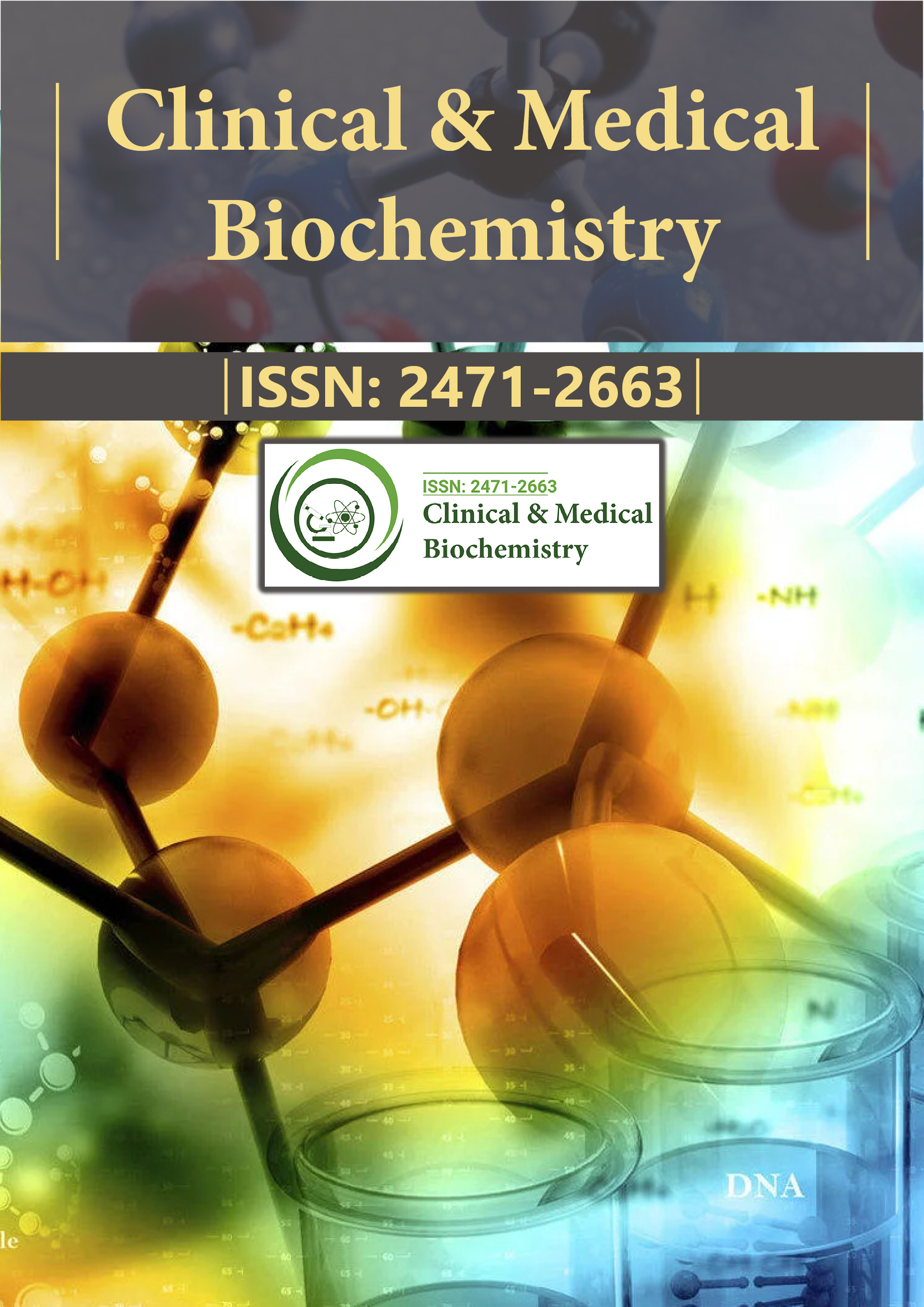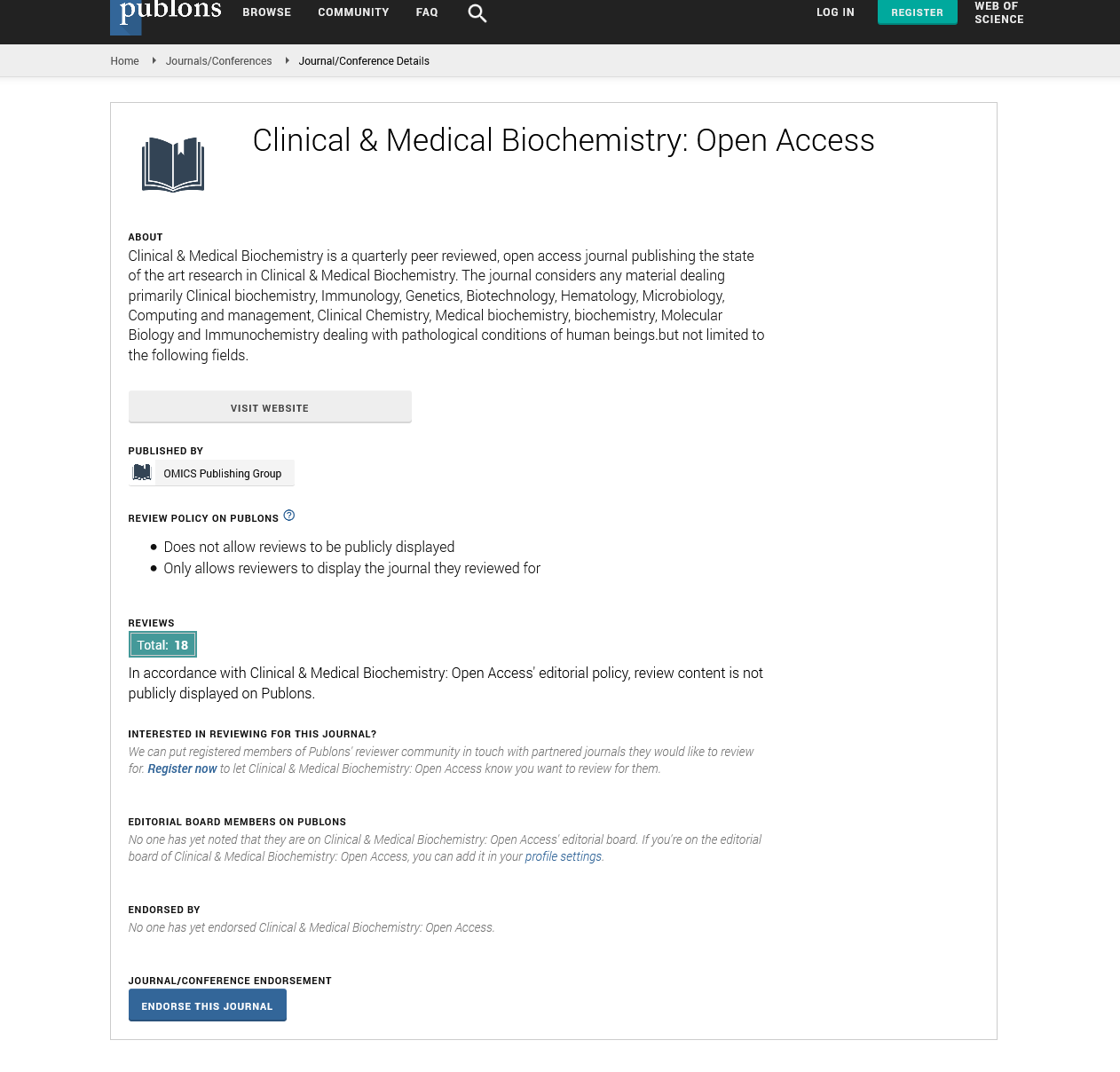Indexed In
- RefSeek
- Directory of Research Journal Indexing (DRJI)
- Hamdard University
- EBSCO A-Z
- OCLC- WorldCat
- Scholarsteer
- Publons
- Euro Pub
- Google Scholar
Useful Links
Share This Page
Journal Flyer

Open Access Journals
- Agri and Aquaculture
- Biochemistry
- Bioinformatics & Systems Biology
- Business & Management
- Chemistry
- Clinical Sciences
- Engineering
- Food & Nutrition
- General Science
- Genetics & Molecular Biology
- Immunology & Microbiology
- Medical Sciences
- Neuroscience & Psychology
- Nursing & Health Care
- Pharmaceutical Sciences
Opinion - (2023) Volume 9, Issue 3
The Immunomodulatory Potential of Mesenchymal Stem Cells in Immune-Mediated Bone Marrow Failure Syndromes
Jibi Kasarabada*Received: 01-May-2023, Manuscript No. CMBO-23-21833; Editor assigned: 04-May-2023, Pre QC No. CMBO-23-21833 (PQ); Reviewed: 18-May-2023, QC No. CMBO-23-21833; Revised: 25-May-2023, Manuscript No. CMBO-23-21833 (R); Published: 01-Jun-2023, DOI: 10.35841/2471-2663.23.9.170
Description
Bone Marrow Failure Syndromes (BMFS) are a group of rare hematological disorders characterized by ineffective hematopoiesis leading to cytopenias. Immune-mediated BMFS, including aplastic anemia and myelodysplastic syndrome, involve aberrant immune responses targeting hematopoietic stem and progenitor cells in the bone marrow. Current treatment options for these disorders are limited and often associated with significant side effects. In recent years, Mesenchymal Stem Cell (MSC) therapy has emerged as a potential therapeutic strategy for immune-mediated BMFS due to their immunomodulatory properties and regenerative potential. MSCs are multipotent stromal cells that can be isolated from various sources, including bone marrow, adipose tissue, and umbilical cord. They possess immunomodulatory properties mediated through the secretion of soluble factors and cell-to-cell interactions.
MSCs can suppress the activation and proliferation of immune cells such as T cells, B cells, and natural killer cells, while promoting the expansion of regulatory T cells. These immunomodulatory effects are primarily mediated by factors such as indoleamine 2,3-dioxygenase, prostaglandin E2, transforming growth factor-beta, and interleukin-10, among others. In the context of immune-mediated BMFS, MSCs can apply their therapeutic effects through multiple mechanisms. They can inhibit the activity of autoreactive T cells that target hematopoietic cells in the bone marrow, thereby preventing further immune-mediated damage. Additionally, MSCs promote the repair and regeneration of damaged tissues by differentiating into mesenchymal lineages and releasing factors that stimulate the proliferation and differentiation of endogenous hematopoietic stem and progenitor cells. The paracrine effects of MSCs, including the secretion of growth factors, cytokines, and extracellular vesicles, also contribute to their therapeutic potential by modulating the microenvironment and promoting tissue healing.
Clinical studies evaluating the efficacy of MSCs in immunemediated BMFS have shown promising results. In aplastic anemia, infusion of MSCs has been associated with hematological improvement, reduced transfusion requirements, and increased overall survival. Similarly, in myelodysplastic syndrome, MSC therapy has demonstrated beneficial effects, including enhanced hematopoiesis and decreased dependence on red blood cell transfusions. The immunomodulatory properties of MSCs are believed to contribute to these positive outcomes by suppressing the immune-mediated destruction of hematopoietic cells and creating a favorable microenvironment for hematopoiesis. However, several challenges need to be addressed for the widespread implementation of MSC therapy in immune-mediated BMFS. One of the key challenges is the standardization of MSC manufacturing protocols to ensure consistent quality and potency of the cells. Variability in MSC characteristics among different donors and isolation methods can impact their therapeutic efficacy. Additionally, long-term safety and potential adverse effects of MSC therapy need to be thoroughly investigated, considering the potential for immunosuppression and the risk of malignant transformation. Another important consideration is the timing and mode of MSC administration.
The optimal treatment window and dosage of MSCs in immunemediated BMFS are yet to be determined. Early intervention may prevent irreversible bone marrow damage, while late-stage disease may present challenges for successful engraftment and regeneration. The route of administration, such as intravenous infusion or local injection, also needs to be carefully evaluated for its effectiveness in delivering MSCs to the bone marrow microenvironment. Moreover, the selection of appropriate patient populations for MSC therapy in immune-mediated BMFS is crucial. Patient characteristics, such as age, disease severity, and prior treatment history, may influence the response to MSC therapy. Identifying biomarkers or predictive factors that can help identify patients who are most likely to benefit from MSC treatment is an ongoing area of research. Furthermore, the cost-effectiveness of MSC therapy and its integration into existing treatment algorithms need to be considered. MSC therapy is a personalized and potentially expensive approach that requires specialized facilities and expertise. Cost-benefit analyses and health economic evaluations are necessary to assess the value and feasibility of incorporating MSC therapy into routine clinical practice.
Conclusion
Mesenchymal stem cell therapy grips potential as a novel treatment approach for immune-mediated bone marrow failure syndromes. The immunomodulatory properties and regenerative potential of MSCs make them attractive candidates for improving hematopoiesis and suppressing immune-mediated damage in the bone marrow microenvironment. Clinical studies have shown encouraging results, but several challenges, including standardization of manufacturing protocols, determination of optimal dosing and timing, assessment of long-term safety, and cost-effectiveness considerations, need to be addressed. With further research and advancements, MSC therapy may offer a valuable therapeutic option for patients with immune-mediated BMFS, potentially transforming the management of these challenging disorders.
Citation: Kasarabada J (2023) The Immunomodulatory Potential of Mesenchymal Stem Cells in Immune-Mediated Bone Marrow Failure Syndromes. Clin Med Bio Chem. 9:170.
Copyright: © 2023 Kasarabada J. This is an open-access article distributed under the terms of the Creative Commons Attribution License, which permits unrestricted use, distribution, and reproduction in any medium, provided the original author and source are credited.

